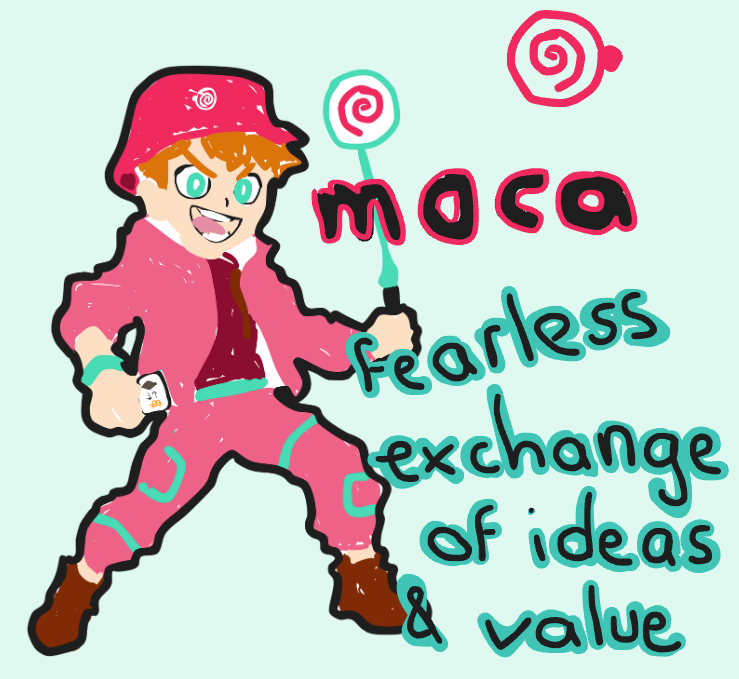Crypto was supposed to flip the system. To take the control of money out of the hands of institutions and put it back where it belongs — the people.
It was supposed to be fair, open, private when you need so, and easy to use without asking for permission.
That’s not what we got.
Instead, we got a ton of apps that barely talk to each other, all claiming to fix the same thing, while somehow making it harder to do anything at all.
Most of what exists today feels like it was built for traders, degens, and whatever the hell is in between, but not for real people.
A few of us still believe in the original idea that crypto can be part of everyday life, and that it can actually solve real problems if you design it for people.

I came with up with the concept of MOCA on a holiday trip to Cuba.
On my first day there, I went out to get some coffee. I was so tired I forgot that I needed to exchange my Mexican pesos to CUC, the local currency, and given how unbanked Cuban society was at the time, using a credit card was out of the question.
After getting some local currency, the evangelist inside me got too strong for me to ignore this issue. I tried to onboard every store owner to crypto, and show them how easy it is to stop relying on the system and centralized banks to exchange ideas and value.
Everyone loved the what.
None understood the how.
On the plane back home, feeling a little defeated and incredibly obsessed with onboarding, I figured out the how.
People love familiar experiences, it makes them feel comfortable and safe. Change is hard, and absolutely out of the question when it comes to their own finances.
It took twenty years for the US to successfully introduce credit cards to the average Joe. Mexico, my home country, still struggles with adopting this technology.
Crypto is everything but familiar. If I ever want to onboard hundreds of millions of users into crypto, it has to be through an app that speaks human, but runs on crypto.
An app that let’s you send money like you would send a message, pay with your phone like you would hand over some money, have a username just like you have a name, not a 42-character code that makes you feel like you just got teleported to the Blade Runner movie.
One app.
Built for people.
No mention of crypto, no hints at blockchain tech, and definitely no buzzwords around it.
A broken yet normalized experience
The average user experience in crypto in 2025 is still a mess.
You need a wallet to hold assets, an exchange to swap, a bridge to move chains, a dApp browser for tools, and a AI agent that guides you through the process.
No wonder why its taken my mom so long to get into crypto.
This user experience wasn’t designed, it just happened as the industry became more mature; it also happened because like on every other niche that starts getting adopted, opportunists and extractors figure out there’s value to be well, extracted.
We kept stacking new tools without fixing the basics.
You wouldn’t accept this in any other part of your digital life, but since its crypto, you forgive the terrible user experience. A normal person doesn’t need five apps to manage their money, buy a coffee, transfer a friend $20 for lunch, and stay in touch with their grandpa.
But in crypto, we’ve let fragmentation slide under the excuse of “it’s still early”, and we actually suppport this fragmentation because “my chain is better than yours, and I want my token to moon more than yours”.
It’s not early anymore.
Moca is crypto that feels like messaging
I set to find a like minded team with the same passion for OG blockchain foundations and crypto pillars, and we began building MOCA with one purpose, and one purpose only:
To use crypto without thinking about it.
To send money without asking for a wallet address, to scan a code and pay without opening five tabs, to set a time to have lunch with to someone, and then transfer them our share of the bill.
All in one place.
This wouldn’t be possible without the pioneers and innovators that came before us, those who developed the infrastructure we have now: real-time chains, mobile-first wallets, better cross-chain rails.
The Tech was there, but no one had wrapped it in a normal experience.
So we did.

You can join MOCA on this journey, it’s still early. Just give us a follow here, or check out our socials in the linktree in our bio.
Zeymer
Founder of MOCA